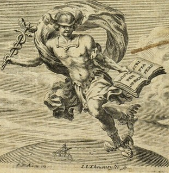Medieval Magic in Theory
May 6, 2021 in Abstracts of Conference Papers, Conference, International Congress on Medieval Studies, Kalamazoo, Societas Magica
Medieval Magic in Theory:
Prologues to Learned Texts of Magic
Session Organized by Vajra Regan
***

Hermes Trismegistus. Frontispiece image (Lyons, 1669) via Wikimedia Commons and Wellcome Images.
Session (1 of 3) Co-sponsored by
the Research Group on Manuscript Evidence
and the Societas Magica
at the
56th International Congress on Medieval Studies
(10–15 May 2021)
2021 Congress Program Announced
Congress Session 103, Virtually on
Tuesday, 11 May at 11:00 am EDT
= 2021 Congress Program, pages 38–39
Our plans for this 2021 Session adapt its plan for the cancelled 2020 Congress. Now it is co-sponsored by the Research Group and the Societas Magica, and parts of the contents have been updated.
Scope & Aims
The prologues to medieval texts of learned magic could serve a variety of functions. They were a space for their authors to announce the theme of the work, to situate the work within a specific literary, philosophical, or theological landscape, and to lay special claim to the reader’s attention. Consequently, these prologues have much to tell us about the traditions and beliefs underlying certain magical texts. Moreover, because many magical texts are substantially anonymous compilations, their prologues often provide unique access to the lives and contexts of the men and women behind the parchment.
The aim of this session is to explore these still largely understudied prologues which testify to the variety of medieval approaches to ‘magic’. We are especially interested in how magic is theorized in these prologues. What insights do these prologues offer into contemporary debates about the epistemological status of magic? Moreover, what can they tell us about the social, religious, and institutional contexts of their authors and readers?
